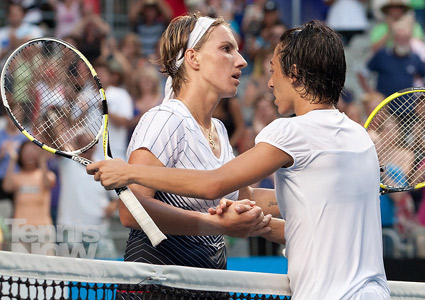
By Franklin L. Johnson
© Mark Peterson/Corleve
(January 23, 2011) John Isner and Nicolas Mahut tried to take tennis from here to eternity in the three-day saga at Wimbledon that was the longest match in tennis history. On Sunday in Melbourne, Francesca Schiavone and Svetlana Kuznetsova mounted a return to forever match.
Fueled by ferocity, Francesca Schiavone fought off six match points to finally subdue Svetlana Kuznetsova, 6-4, 1-6, 16-14 to prevail in four hours, 44 minutes — the longest women's Grand Slam match in Open Era history — and advance to the Australian Open quarterfinals.
While matches which last as long as a television mini series are a gripping advertisement for our game, exhibit the physical and emotional demands of the sport and showcase the valiant spirit of the players, I'm dead set against them.
I'm here to implore tennis officials to stop the madness and end the epics.
Install a fifth-set tie breaker as a major mandatory rule. Are you listening International Tennis Federation or does someone need to pass out from exhaustion first?
Are these excruciating encounters dramatic?
Absolutely. They can take tennis to new audiences who are engrossed in the growing drama and gain international attention for our great game. But I've got to call it as I see it and clearly while these marathon matches provide drama for fans they deplete and sometimes damage players.
Everyone remembers Isner's mind-boggling 70-68 fifth-set decision over Mahut in a match that spanned 11 hours, 5 minutes at Wimbledon. But what toll did that take on these inspired tennis warriors?
Big John was so physically beat up he could barely run in losing his second-round match to Thiemo de Bakker at Wimbledon and mauled Mahut was banged up for the rest of the season.
The tennis world celebrated David Nalbandian saving two match points to outpoint Lleyton Hewitt in a five-set marathon in Melbourne last week, but Nalbandian was a shadow of himself in the second round and was so exhausted he tapped out meekly in retiring against Richard Berankis.
Now fantastic Francesca Schiavone will surely feel the wrath of going the distance. How much life will Franny have in her legs and lungs when she faces road runner Caroline Wozniacki in the quarterfinals?
You don't need a medical degree to know Schiavone will be physically floundering for her next match.
These contests drain excellent players of their stamina which may take them several weeks if not months to recover. While they're doing this, we'll be short of their optimum match playing skills.
The tour doesn't benefit in any way from driving great players to the edge of complete physical, mental and emotional exhaustion.
What good does this do?
I say it's well past time to limit the ends of all matches with tie breakers. I'm a firm believer that less is more in that players will tend to bring their best at the ends of matches when they know the finish is certain. When a match is open ended, players will naturally hold back their energy in reserve to deal with the uncertainty. I say better play comes from establishing the length of a match from the very beginning. Then, the players will be able to determine how to manage their resources to maximum effect.
Are you for or against these Texas-style death matches? I'm against 'em.
The marathon match has run its course.
End the epics before someone gets hurt.
Tennis Now contributing writer Franklin L. Johnson is a writer, poet and avid tennis player based in New York. He has covered professional tennis for three decades. His recent columns include Maria Sharapova Will Rise, Caroline Wozniacki Will Fall; Open Observations: Only The Strong Survive; Champs Can Sow Seeds of American Tennis Growth; The GOAT Game Changer; What Do Roger Federer and Andy Murray's Coaching Changes Mean? American Anthem Needs New Tune; Tomas Berdych Played Tame Final and A Case For Vera.